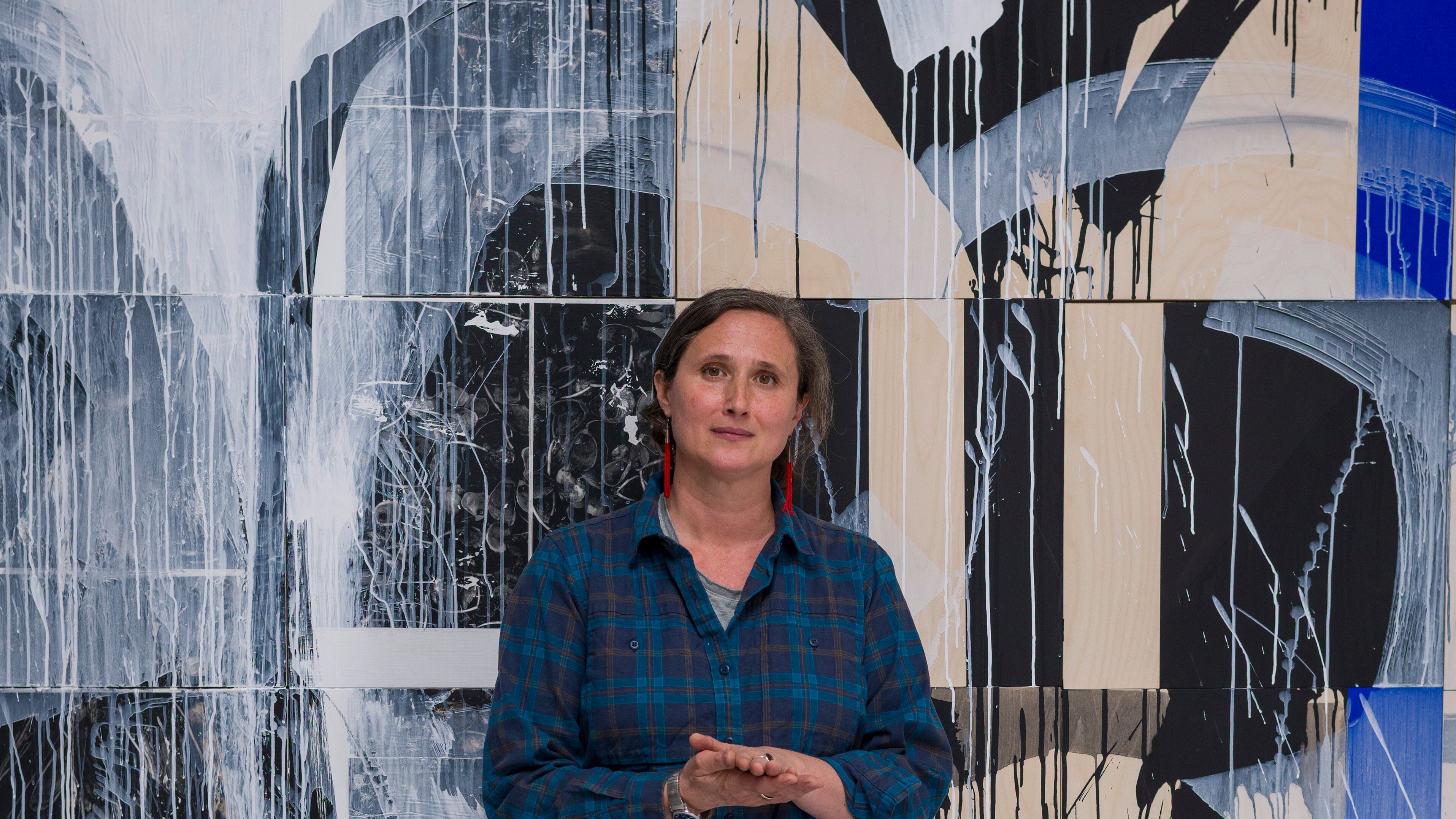Hanis Coos artist Sara Siestreem is known for her abstract paintings grounded in her Indigenous heritage. In dance apron, her second solo exhibition at Elizabeth Leach Gallery, Siestreem continues her broad but focused exploration of imagery addressing land, place and collective identity.
Siestreem’s visual language is rooted in patterns drawn from the Coos weaving tradition. Place and ecology are directly reflected in the work. She was awarded the Hallie Ford Fellowship in the visual arts this year. The fellowship is for artists who have “demonstrated a depth of sophisticated practice and potential for significant future accomplishment,” according to a statement by The Ford Family Foundation.
Salmon, scallops and oyster shells show up in photocopied images and geometric patterns alongside gestural acrylic brushstrokes and color pencils in cloudy whites, vigorous blues and rich ebonies on a massive 40-panel painting also titled dance apron (2025) that will span most of an entire gallery wall. The painting, in about a year (2025), is composed of seafoams, teals, and inky sables that pull from similar contemplative imagery of estuaries and what Siestreem’s show statement describes as the “first foods from Indigenous lifeways”. Siestreem balances heavy themes throughout her practice, like celebrating tradition while also showing the destruction caused by environmental damage and oppression.
The series black widow minion delves into America’s colonialization history, past and present. Eight figures made of slip-cast ceramic dance caps adorned in glaze, Japanese indigo-dyed cotton, and Czech white heart beads are positioned facing each other, representing ancestor guardians. They conjure thoughts of grief and lamentation, and feel particularly relevant in the current political landscape.
“The exhibition underscores Siestreem’s commitment to ecological and social justice, Indigenous feminism and survivance, and the continued expansion of her visual language,” reads Elizabeth Leach Gallery’s show statement.
Siestreem’s work considers basket weaving traditions—which hold reverence in Native American culture for their connection with the natural world—as far more than utilitarian containers. A silhouetted mountain range and golden hour sky are referenced in regard to adoration of the land in skyline (2024), a series of slip-cast ceramic baskets adorned with gold luster. Reimagined in clay, these clam baskets, originally woven by the artist from spruce root, allow viewers to reflect on Manifest Destiny’s expansionist practices.
Siestreem advocates for social justice and Indigenous feminism through her practice. Her crazy quilt (2016-2025) repurposes elements from other paintings into something new, much like a quilt coalesces scraps of fabric into a thoughtful, unified comforter. The title suggests an acknowledgement of women’s labor, particularly aspects often unseen. Further spotlighting the ambiguity in women’s work, Siestreem intentionally incorporates imagery of her hand weaving and holding baskets.
Poised as one of this fall’s most salient exhibitions, Siestreem’s dance apron series of paintings and sculptures delves into key conversations on Indigenous rights and culture, and the complicated history of displacement. It also aims to uplift and celebrate traditions, connecting to ecology and specifically Indigenous women, with visual tenacity. Siestreem’s meticulous craftsmanship is apparent across her mediums (sculpture, weaving, or paintings), which only offers more opportunities for viewers to appreciate and consider her work and its meanings.
SEE IT: dance apron by Sara Siestreem at Elizabeth Leach Gallery, 417 NW 9th Ave., 503-224-0521, elizabethleach.com. Opening reception 5:30 pm Tuesday, Sept. 4; on view through Oct. 11. Free.

